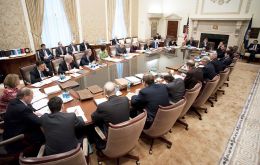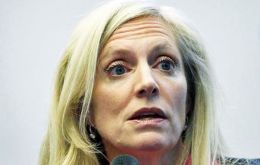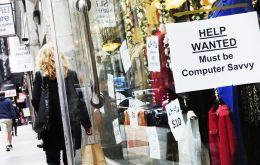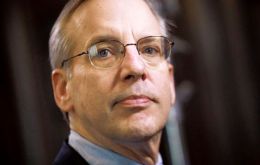MercoPress. South Atlantic News Agency
Tag: Federal Reserve
-
Saturday, December 3rd 2016 - 07:32 UTC
US unemployment falls to nine-year low in November, 4.6%, but earnings slowdown

United States unemployment rate fell to a nine-year low in November, adding to expectations that US interest rates will rise later this month. Figures from the Labor Department showed the US economy created 178,000 jobs in November, while the jobless rate fell to 4.6% from 4.9% in October.
-
Friday, November 18th 2016 - 09:15 UTC
Yellen intends to remain her four-year term; anticipates rate increase “relatively soon”

The United States Federal Reserve chair Janet Yellen told Congress on Thursday that she is not stepping down. Her statement follows on strong attacks during the campaign from president elect Donald Trump who claimed the Fed was favoring president Barack Obama and candidate Hillary Clinton with its low interest rate policy.
-
Thursday, November 3rd 2016 - 10:20 UTC
Big Danger at the Lower Bound

By Kenneth Rogoff
Markets nowadays are fixated on how high the US Federal Reserve will raise interest rates in the next 12 months. This is dangerously shortsighted: the real concern ought to be how far it could cut rates in the next deep recession. Given that the Fed may struggle just to get its base interest rate up to 2% over the coming year, there will be very little room to cut if a recession hits. -
Sunday, October 30th 2016 - 22:44 UTC
US economy expands at its fastest pace in two years in the third quarter

The US economy grew at the fastest pace in two years in the third quarter, initial figures have indicated. The world's largest economy grew at an annual rate of 2.9% in the three months to September, the Commerce Department said. Analysts had predicted growth of just 2.5%.
-
Monday, October 10th 2016 - 10:35 UTC
Fed vice chairman sees the anti-globalization political speech as main threat to trade and growth
![”What worries me about the anti-globalization [view] is the view that globalization is useless and we ought to be back and worry about ourselves,” said Fischer.](/data/cache/noticias/56782/260x165/fischer.jpg)
Federal Reserve Vice Chairman Stanley Fischer said a rising tide of opposition to international trade and integration threatens global growth. Global trade this year will grow at the slowest pace since 2007, according to the World Trade Organization.
-
Tuesday, September 13th 2016 - 11:16 UTC
Fed expected to keep cautious approach to interest rates next week

North American stock markets rallied today after a U.S. Federal Reserve official hinted that the central bank remains cautious about interest rate hikes. Fed governor Lael Brainard said the risk with raising rates too soon is that it could damage the fragile economy.
-
Monday, September 5th 2016 - 08:58 UTC
US economy adds more jobs in August, but not as many as expected

The expanding US economy added another 151,000 jobs in August, according to the US Labor Department, while the unemployment rate stayed at 4.9%. The number of extra jobs was sharply down from an upwardly revised July figure of 275,000. It was also a smaller rise than the average monthly increase of 204,000 seen during the previous 12 months.
-
Friday, August 19th 2016 - 13:17 UTC
US Federal Reserve reiterates concern with stubbornly slow rate of inflation

United States Federal Reserve officials believed last month that near-term risks to the U.S. economy had subsided and that an interest rate increase could soon be warranted. But they did not indicate when they would likely raise rates.
-
Monday, August 1st 2016 - 13:16 UTC
US economy grows at slower pace in second quarter despite strong consumer spending

The United States economy grew at a much slower pace than expected in the second quarter and GDP was revised down in the first three months of the year. The world's largest economy grew at an annual rate of 1.2% in the three months to June, far below forecasts of 2.6%, Growth for the first quarter was revised down from 1.1% to 0.8%.
-
Thursday, July 28th 2016 - 13:04 UTC
Fed sees current conditions remaining unchanged, at least until December

The United States Federal Reserve on Thursday left key interest rates untouched but acknowledged improved economic performance, suggesting a rate increase may be on the horizon in 2016.
